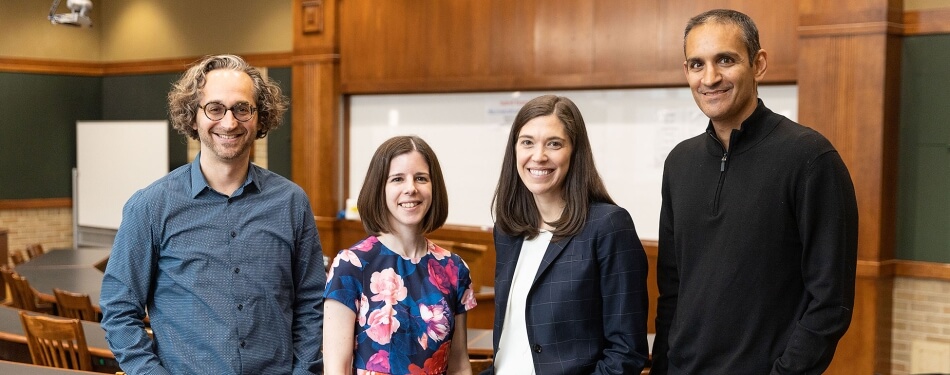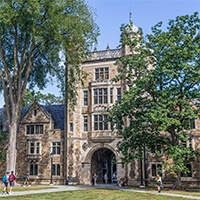Professor Gil Seinfeld has won the 2023 L. Hart Wright Teaching Award, and three new faculty awards honor Professors Margaret Hannon, Emily Prifogle, and Vivek Sankaran.
The Law School Student Senate chose the award winners from student nominations. While the L. Hart Wright Award is well established, the other three honors—for legal practice teaching, experiential teaching, and innovative and inclusive teaching—are new this year.
“The Law School Student Senate expanded the annual teaching awards in order to recognize the incredible breadth and depth of talent among our faculty,” said student AJ Tsang, the incoming president of the organization. “In the coming year, LSSS also plans to name the new awards based on major figures from Michigan Law history or the legal profession writ large.”
L. Hart Wright Award for Excellence in Teaching: Gil Seinfeld
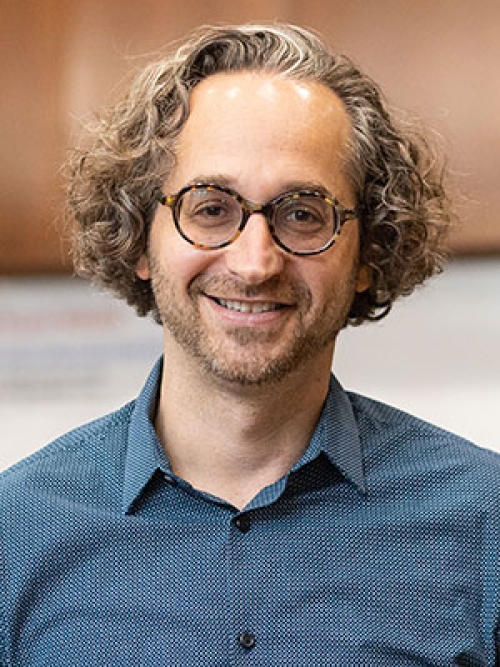
This award goes to a faculty member who exemplifies extraordinary teaching, dedication to students, and the spirit of Michigan Law. It is named after a beloved Michigan Law professor who was renowned in the field of tax law.
“(Professor) Seinfeld enters class with an immense level of enthusiasm for the subject and a zeal for helping his students understand the material. He is able to transform a normally dry subject into something tangible and interesting,” wrote one of the students who nominated him.
Seinfeld—the Robert A. Sullivan Professor of Law—is a previous associate dean for academic programming. He teaches and writes about federal jurisdiction, the constitutional law of federalism, and civil procedure. He also won the L. Hart Wright Award in 2006. Prior to joining the faculty in 2005, Seinfeld was an associate at the law firm of Wilmer Cutler Pickering Hale & Dorr (now WilmerHale), where he focused on appellate litigation.
“I was truly stunned when I learned that I received this award,” Seinfeld said, noting that in recent years his teaching has been reduced because of research leave and his administrative responsibilities. “As the COVID semesters played out, it felt to me as if something fundamental about my relationship with students was changing, and I experienced it as a significant loss. Teaching and working with students (inside the classroom and out) has always been important to me and rewarding, and I returned to the classroom this year unsure whether I was still capable of doing those things well.
“Receiving this award is extremely gratifying. It’s nice to know that I can still connect with students and help them to understand the law. It’s nice to know that they find me supportive and accessible and that they know I’m committed to their learning. And it was especially nice to be reminded throughout the semester that teaching is fun and challenging in all the best ways. It was nice to be reminded of all the things that made me love teaching from the very first day I joined this faculty.”
Faculty Award for Dedication to World-Class Legal Practice Teaching, Students, and the Spirit of Michigan Law: Margaret Hannon, ’05
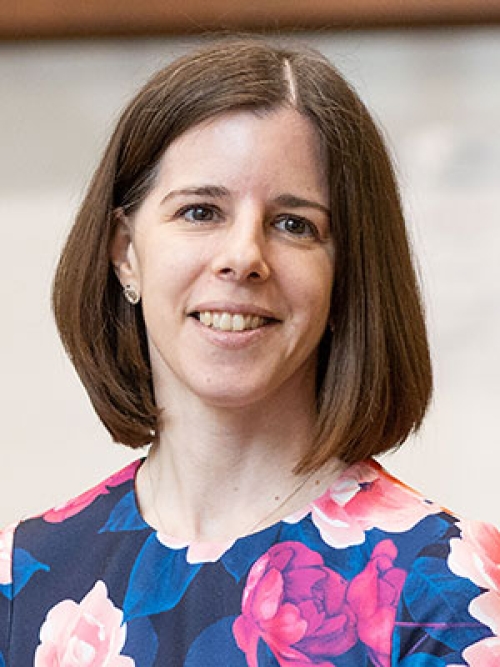
This new award honors a member of the legal practice faculty who develops their students’ legal research and writing skills from the moment they set foot on campus as 1Ls.
“From day one, I understood that Professor Hannon was a person who cared deeply about students—especially her own, yes, but the Michigan community as a whole,” one of her student nominators wrote. “She broke down bamboozling legal writing topics into multiple accessible formats, communicated often that she was our advocate, and backed up her words with unwavering support. She’s the prof whose office you find yourself in when you have your first decent cry of the semester. …I’m a better member of the Michigan and legal communities for being her student.”
Hannon, ‘05, clinical professor of law, joined the Michigan Law faculty in 2013. She previously taught at Northwestern Law School, where she also served as the assistant director and interim director of the legal research and writing program. In recognition of her teaching, Hannon received Northwestern Law’s Dean’s Teaching Award and Dean’s Teaching Award Honorable Mention. Hannon is co-editor-in-chief for Legal Communication & Rhetoric, the journal of the Association of Legal Writing Directors, and previously served as the editor-in-chief and managing editor of the Legal Writing Institute’s Monograph Series. She is the co-author of From Theory to Practice: Employment Discrimination Law. Hannon is currently serving as a member of the Michigan Supreme Court and State Bar of Michigan’s Task Force on Well-Being in the Law.
“I am incredibly honored to receive this award,” Hannon said. “I love working with our wonderful Michigan Law students, and I’m very grateful to be recognized for doing that work, especially with the inaugural award.”
Faculty Award for Dedication to World-Class Clinical & Experiential Teaching, Students, and the Spirit of Michigan Law: Vivek Sankaran, ’01
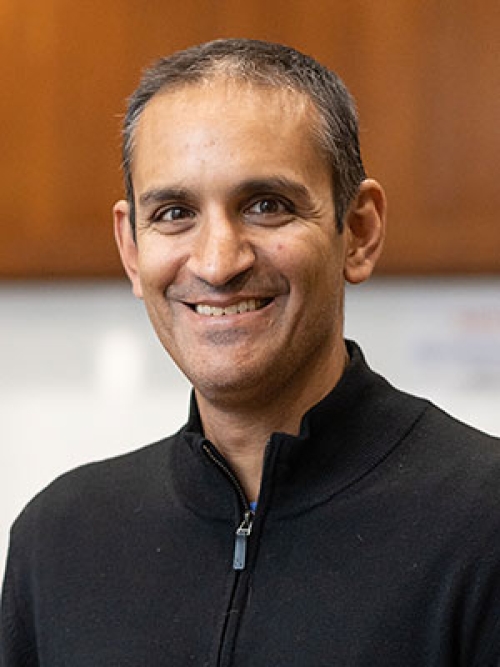
This new award honors a faculty member who prepares Michigan Law students to support real-life clients.
“(Professor Sankaran) is a true gem,” one of his nominators wrote. “He is an outstanding educator in the best sense of the word. He combines his deep knowledge of the child welfare system with an inspiring teaching philosophy to push ourselves to be the best advocates and human beings we can be, and he leads by example. He has inspired me to care deeply about work (and) have a meaningful career while being a well-rounded person. I couldn’t recommend him enough. (He is) one of the most inspiring professors I’ve ever met in law school.”
Sankaran, ’01, clinical professor of law, joined the Michigan Law faculty in 2005. He serves as the director of the Child Advocacy Law Clinic and the Child Welfare Appellate Clinic. He also founded the Detroit Center for Family Advocacy. His work focuses on improving outcomes for children in foster care by empowering their parents and strengthening decision-making in juvenile courts. He co-edited the first national book for family defense lawyers and the third edition of Child Welfare Law and Practice, a widely recognized resource. With Professor Bridgette Carr, ’02, he created a course called Designing a Fulfilling Life in the Law, which challenges students to apply design thinking to their lives and careers.
“I was blown away when I heard I got the award,” Sankaran said. “Nothing means more to me than my work with my students. They inspire me in so many ways. Seeing their impact on families is the gift they give me every single day.”
Faculty Award for Innovative, Interdisciplinary, and Inclusive Teaching: Emily Prifogle
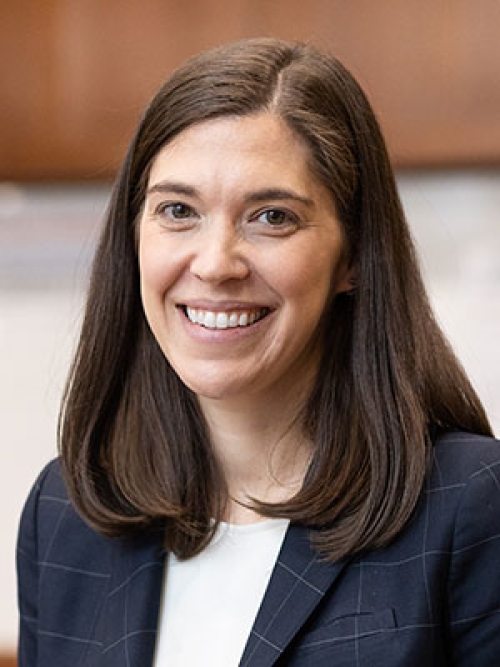
This new award honors a faculty member whose teaching style goes beyond the traditional case method—contextualizing the law through history and social science, as well as employing diverse learning media such as videos, news articles, and field trips.
One nominator wrote, “Professor Prifogle…curat[ed] a thoughtful and interdisciplinary syllabus, using a variety of pedagogical tools during class.” Another wrote, “She assigned readings that went beyond just casebook and law review articles to include important book excerpts and articles from other academic areas to broaden our views, and understand the intersection of historical trends with how cases were decided. Finally, she was inclusive—both to students and with the material she chose. Michigan Law is much better for her extremely hard work to develop a class like this.”
Prifogle—an assistant professor of law as well as assistant professor of history by courtesy—joined the faculty in 2020 and teaches property law and a seminar on rural law. She is a legal historian researching how individuals and governments used legal tools to shape rural communities. Her forthcoming book Making the Rural Midwest: A Legal History, 1920-2020 argues that the legal remaking of rural communities was a central feature of 20th-century America. She is a co-director of the Program in Race, Law, and History.
“I’m thrilled that the LSSS has expanded the scope of the annual teaching awards to include recognition of interdisciplinary and inclusive teaching,” Prifogle said. “My own scholarship is interdisciplinary, so I’ve always enjoyed integrating my approach to research into classroom teaching. I strive to be intentional, transparent, and empathetic with my pedagogical approach and try to create both inclusive teaching materials and learning environments. I’m grateful to teach deeply engaged and committed students at Michigan Law who are interested in interdisciplinary approaches to learning doctrine and who make teaching rewarding and fun.”

